Mary Kingswood's Blog, page 14
July 9, 2023
Review: Talk of the Town by Joan Smith (1979)
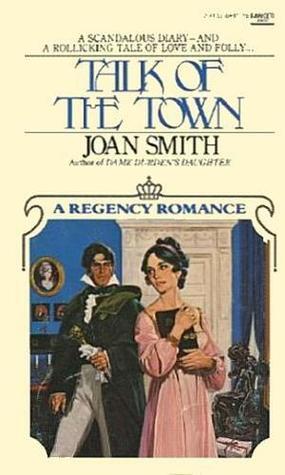 This was a total riot, good fun from start to finish. It’s very traditional in style, but given its age that’s only to be expected, and unlike some of that vintage, the romance was quite well developed and not bolted on as an afterthought. And there was not a single kidnapping or elopement or other overblown melodrama.
This was a total riot, good fun from start to finish. It’s very traditional in style, but given its age that’s only to be expected, and unlike some of that vintage, the romance was quite well developed and not bolted on as an afterthought. And there was not a single kidnapping or elopement or other overblown melodrama.
Here’s the premise: Daphne Ingleside lives a quiet, respectable life in the Wiltshire countryside, but when her disreputable Aunt Effie, now a widow for the second time after being scandalously divorced by her first husband, asks for her company in London, she sees an opportunity for a little fun and a somewhat more lively setting. But this isn’t the conventional Regency with balls and routs and the Marriage Mart. Aunt Effie is too poor and disreputable to be invited anywhere. Daphne doesn’t mind. London is exciting enough, and she doesn’t much care to be paraded around anyway. She’ll have a nice quiet time with her aunt, and find something to fill the time. Perhaps her aunt, with her long and unusual history, could write her memoirs?
And all of a sudden, Aunt Effie’s quiet, retired life becomes rather exciting. As soon as the notice appears in the newspaper that she’s writing her memoirs, old friends start appearing and pressing large sums of money into her hands. Some were people she loaned money to, who never paid it back, but some were vaguer about their reasons. Effie thinks they’re just being kind to an old friend, but Daphne realises at once that they all hope to keep their own names out of the book. She finds it all vastly amusing, and of course the money is a great help to Effie.
Into this entertaining situation comes the very unentertaining Richard, the Duke of St Felix, sent by his sister to keep her husband’s name out of the book. But he’s an arrogant so and so, and Daphne can’t resist crossing swords with him, winding him up thoroughly. He leaves believing they are hardened blackmailers, and becomes determined to best the sharp-tongued little termagant. Somehow, he finds reason after reason to return to Aunt Effie’s shabby little apartment to spar with Daphne, and somehow, little by little, Daphne and Effie are edged back into society again, to be befriended by Beau Brummell and the Prince of Wales, no less. Their success is assured… or so it would seem. But their position is precarious, and one slip could see them fall from grace again.
From then onwards, nothing quite goes as expected (at least, not as I expected, anyway). But the romance develops beautifully. It’s always problematic for an author who’s set up the two main characters to be at each other’s throats – enemies to lovers is surely the most difficult trope to pull off, because how can two people who hate each other so much ever end up in love? It defies credibility, yet Joan Smith manages it beautifully, without any trickery, as Daphne and Richard gradually come to realise how things are. Daphne is a little bit too eccentric at times, and perhaps too determined to defy convention just to spite her ‘enemy’, but Richard is steadfast and true, and quite determined to see Daphne and her disreputable aunt restored to society, come what may.
For those who dislike Americanisms, you might want to avoid this one, littered as it is with ‘gotten’ and ‘fall’ and others too numerous to mention, but I was enjoying myself too much to mind. It’s highly recommended for banter aficianados, though, for the spirited exchanges between the two protagonists are glorious. Joan Smith can be a bit variable, but I found this to be one of her more successful efforts. Five stars.
Review: Elyza by Clare Darcy (1976)
 This was really quirky in some ways, but it was still a lot of fun. It’s necessary to suspend all critical faculties, however, for none of it makes a great deal of sense, but if you can go with the flow, it’s highly readable.
This was really quirky in some ways, but it was still a lot of fun. It’s necessary to suspend all critical faculties, however, for none of it makes a great deal of sense, but if you can go with the flow, it’s highly readable.
Here’s the premise: Elyza Leigh is that staple of the Regency romance, a girl making her debut in the season who’s being pushed into marrying a worthy but deadly dull man. Rather than submit, she dresses in boys clothes and runs away (yes, we’re deep into Cliche-land here), in an attempt to get to her aunt in Bath, but after a night at an inn, her purse has been stolen and she can’t pay her shot. Happily, a random stranger comes to her aid, the fabulously wealthy Cleve Redmayne, newly returned from India, who’s hoping to make his debut in English society – and find a beauty he spotted briefly two years before. He sees Elyza as someone who can help him. She’s in society herself, so she knows everyone, doesn’t she? And since they both appear to be heading to Bath, where his lost love is also heading, he believes, they can join forces.
Now Redmayne (I refuse to call him Cleve; I’m sure that’s a typo, because the blurb has him as Clive, but no matter) is not worldly wise to the ways of England, so before long the pair, aided and abetted by Redmayne’s vast retinue, are enjoying a country fair and getting into all sorts of difficulties of the reputation-ruining variety. Along the way, they pick up bouncy Nicholas Crawfurd (another odd name) who is also ripe for any lark. Redmayne and Crawfurd aren’t in the least bothered by Elyza’s boy’s clothes, but when Colonel Hanley turns up, sent by Elyza’s London chaperone to retrieve her, they realise just what a mess she is in.
Now, Redmayne is one of those magical McGuffin characters, who is so fabulously rich and surrounded by so many efficient and willing servants, that he’s able to solve any problem. In an instant, he has devised a cunning plan to get Elyza safely back to London, reputation intact. Crawfurd and the Colonel are sworn to secrecy, and all goes according to plan. Redmayne is actually a fascinating character, because he’s supremely self-confident (and with some justification) and yet at the same time he’s quite different from the usual run of Regency heroes. There’s something off-kilter about him, his assurance mixed with over-the-top displays of wealth and a slightly wobbly grasp of social protocol. He is a little too good at everything for my taste (what can I say, I like a beta hero myself).
The plot takes a dramatic swerve here, because somehow, for reasons I missed, Elyza and crew are going to Brighton for the summer, and Redmayne is also going, abandoning his previous plan as soon as he discovers from Elyza that a certain young lady by the name of Corinna Mayfield will also be there. Redmayne saw her briefly two years before and has been passionately in love with her ever since. Now that he’s rich, he intends to sweep her off her elegantly shod feet and waft her away to the altar. The bouncy Mr Crawfurd comes along for the ride, and so what seemed to be a road trip to Bath becomes a seaside holiday, featuring an appearance by no less a personage than the Prince Regent himself. Naturally, Elyza’s deadly dull suitor, Sir Edward Mottram, is also on hand to make the dreaded proposal.
This was written in the heyday of Georgette Heyer and it’s highly influenced by her work. The wheeling out of Prinny and other historical figures, for instance, and the detailed description of the Brighton Pavilion are very Heyer, and the whole plot is infused with the sort of unlikely happenstances and fairytale events and characters that make it more of a romp than a romance. There’s a silly subplot involving a villain that Elyza deals with very badly, there’s a even sillier duel and then the inevitable kidnapping (what is it with Regencies and kidnappings?). The main romance is fairly unconvincing, but that’s par for the course for books of this age, so I won’t complain too much. It’s funny, and I can forgive a book a great deal if it makes me laugh.
The writing is fine, and my only complaint is that the book seems to have been digitised with a character reader and not properly proofread, because every once in a while there’s a word mid-sentence that makes no sense at all. Sometimes it’s possible to work out what it should be but not always. Other than that, the book is a light-hearted read, true to its vintage. Don’t expect depth or rounded characters or even a plot that makes much sense but it’s hugely fun and I enjoyed it tremendously. Five stars.
June 12, 2023
Review: The Cockermouth Mail by Dinah Dean (1982)
 I absolutely loved this book, every last word of it. It’s a very simple story, but our hero and heroine are lovely, there’s a strong backup cast and a wealth of local detail that I found fascinating.
I absolutely loved this book, every last word of it. It’s a very simple story, but our hero and heroine are lovely, there’s a strong backup cast and a wealth of local detail that I found fascinating.Here’s the premise: Miss Dorcas Minster, the daughter of a disgraced baronet now employed as a governess, is on her way north to take up a new position. It doesn’t sound very appealing, but nothing else offered, and what else can she do? She takes the mail coach, along with a mixed bunch of other passengers. Chief among them is Sir Richard Severall, a colonel in the dragoons, now invalided out with a knee injury, travelling by mail because his own coach has broken down.
Needless to say, since it’s almost Christmas, there’s soon snow falling and before too long the coach is off the road, and everyone has to walk to the nearest inn. Sir Richard, with his bad leg, is too slow to keep up with the rest, and Dorcas stays with him, but gradually the treacherous conditions overcome their strength, and they’re forced to huddle together in the meagre shelter of a large boulder, while they await rescue. Barely conscious, Sir Richard kisses her, to her great shock. Happily, rescue arrives and they are carted off to the inn to be revived, and to meet a couple of other stranded travellers.
I have to say that the inn turns out to be astonishingly well provided with food for so remote a location, so the refugees spend Christmas in great comfort, and even manage to go to church. There’s a bit of a dance with the locals, and the kissing bough makes a timely appearance. This could have been rather dull in other hands, but the book is replete with detail, not just about the inn and the surrounding countryside, but the difficulties of travelling by mail coach over difficult and (in winter) treacherous roads. The author makes the Lake District sound like a foreign and rather hostile country, and the heroine’s rather plaintive longing to return to the south doesn’t seem at all misplaced.
All this being cooped up in an inn cut off from the outside world naturally throws the mail coach passengers together somewhat, and Dorcas, being the only female, finds herself the subject of a certain interest from some of the gentlemen. She’s in a curious position, being the daughter of a baronet by birth, but now a humble governess by trade, and so hard up that she has to borrow money from Sir Richard to pay her shot at the inn, and then there’s the lowering thought: what will he want in return? She can’t afford to assume it’s simple kindness, and since he has no dishonourable thoughts in his head, it doesn’t occur to him to reassure her on the point. And he is so self-effacing that when another passenger starts taking an interest in Dorcas, one he thinks is perhaps a better match for her, he does nothing to press his own suit.
With the romance bubbling along nicely, despite the question of honourable intentions, there’s another problem: there’s a highwayman on the loose somewhere, and one of their fellow passengers is a Bow Street Runner, sent to catch the miscreant. And it’s just possible that one of the passengers is the villain…
So everything boils up nicely to the inevitable conclusion, although with some fun twists that I didn’t see coming at all. Not that I was paying much attention, being so caught up in the gentle but very sweet romance between Dorcas and Sir Richard that the rest was almost irrelevant. I liked very much that Sir Richard’s bad knee was a serious problem that brought him real grief occasionally, and wasn’t just a slight limp that got mentioned three times and then forgotten. I liked, too, the delicate way that Sir Richard tried to show his growing feelings for Dorcas, but without making her feel uncomfortable — although sometimes his enthusiasm got the better of him! Of the side characters, I liked Mr Tupper, the pedantic solicitor who plays a starring a role in the romance eventually, and also Jem, Sir Richard’s mouthy batman from his army days, who spoke his mind in the most colourful language (fortunately most incomprehensibly) yet was fiercely loyal to his quiet master. There is a lot of Heyer-esque cant in this, and local dialect, only some of which is translated, so you have been warned.
A lovely, lovely story, with wonderful low-key characters that it would surely be impossible to dislike. Every word was a joy to read – yes, even the cant! And for those who like that sort of thing, there’s a heart-warming epilogue, too. Five stars, and I’d give it more if I could.
Review: The Mistletoe Test by Diane Farr (2017)
 I’m having a good run of reads at the moment, all of older books or, as in this case, a newer book by an established author. Diane Farr wrote some of my favourite Regencies from around twenty years ago, so it was a real treat to discover this newer work that’s very much in the same vein. It’s a lovely, light read, although with some serious moments when the subject of slavery arises. Very much one for the traditionalists.
I’m having a good run of reads at the moment, all of older books or, as in this case, a newer book by an established author. Diane Farr wrote some of my favourite Regencies from around twenty years ago, so it was a real treat to discover this newer work that’s very much in the same vein. It’s a lovely, light read, although with some serious moments when the subject of slavery arises. Very much one for the traditionalists.Here’s the premise: Felicity Pennington is being threatened with a sixth season in London by her rich, indulgent Aunt Agnes, better known as baronet’s widow Lady DuFrayne. Felicity wouldn’t mind, but it’s surely time her younger sister Lucille, aka Lulu, had her chance. She’s a bit of a madcap hoyden, but perhaps she could make a smaller debut in their home town of Bath over the winter to prepare her – nothing could go wrong, could it?
Aunt Agnes reluctantly agrees, and instantly Lulu gets into trouble at her debut event, managing to tip a water-filled vase over herself. But all is not lost, for appearing miraculously on the scene to rescue her from total ignominy is Oliver Stanhope, who’s everything that’s desirable in Lulu’s eyes, and isn’t at all censorious, despite being the son of a bishop. There’s only one problem – he’s already as good as betrothed to the humourless Miss Almeria Bliss, an inapt name if ever I heard one.
Into all this arrives the person of Sir Gavin DuFrayne, the inheritor of Aunt Agnes’s husband’s baronetcy and the estate but not the fortune, which went to Aunt Agnes. Now that his father has died, he’s sold the plantations in Barbados and has returned home to try to wrest some of that fortune for himself, or at the very least, stop his aunt blowing the whole lot on the deeply unworthy Pennington family. Although he has to admit that Felicity Pennington is good fun, with her sharp mind and willingness to spar with him.
It’s obvious at this point where the story is going, and so it does, with few surprises, but every step of the way is filled with charm and humour and a delightful lightness of touch. The only darker note is the discussion of slavery, where Gavin tries to recruit Felicity to his cause of helping his own freed slaves to come to England, which he isn’t able to do because he stupidly tied up all his money for several years (which is the only misstep in the entire book, because he’s far too smart to do that before he’s done what he promised for the freed slaves; serious plot manipulation there).
Apart from the main characters being anti-slavery (which is a very common theme in modern Regencies and barely worthy of comment, even though there was far more controversy about it at the time), the book is actually quite subversive. For one thing, Aunt Agnes’s husband leaves only the entailed property to his heir, and gives all his money to his widow. Nor does she have it only for her lifetime – it’s hers absolutely. She could give it all to the Penningtons if she wants, or an orphanage, or spend every last penny, leaving the baronet in relative poverty. That would be regarded as wicked in an age when male primogeniture was everything, and a man with a title was expected to live expensively. We’re not really told why he did this, although it’s hinted that Gavin’s father was something of a reprobate, but it’s still a drastic step to take.
The other unusual arrangement is that Oliver Stanhope is his father’s heir, despite being the middle of three brothers. Again, it’s almost invariably the eldest son who inherits, but here it’s shown as an agreement between the men of the family. The eldest and youngest sons wanted to follow their father into the church and Oliver didn’t, so he gets the money. Although I have to say that his delight in his new estate and the enthusiasm with which he threw parties there were delightful. He has so much joie de vie, it’s obvious he’s a perfect match for the exuberant Lulu.
The story eventually winds its way to Christmas and the mistletoe test of the title about which I will say nothing except that it’s all lovely. I would have liked a little more followup with Gavin and Felicity, who were supposed to be the main characters but got pushed into the background by Lulu and Oliver far too often. I liked that the minor characters got their turn in the spotlight, but I wanted to see a bit more of the majors. In particular, I wanted to see a lot more of them falling in love. But that’s not really a complaint. This was a lovely traditional read that put a smile on my face almost from start to finish. Beautifully written, with lots of humour and charm, I can’t give it less than five stars.
Review: Miss Mouse by Mira Stables (1981)
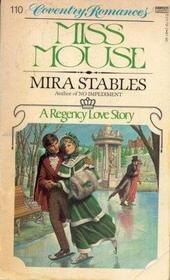 Mira Stables is one of my go-to authors. I can usually depend on finding a great read, although the plots and characters and styles vary wildly from book to book. Some work in spite of quirks, but this one has no quirks at all – it’s a straight down the line traditional Regency that sticks closely to the tropes and manages to have a certain amount of drama without a villain and without the usual kidnapping at the end, so thank heavens for that.
Mira Stables is one of my go-to authors. I can usually depend on finding a great read, although the plots and characters and styles vary wildly from book to book. Some work in spite of quirks, but this one has no quirks at all – it’s a straight down the line traditional Regency that sticks closely to the tropes and manages to have a certain amount of drama without a villain and without the usual kidnapping at the end, so thank heavens for that.Here’s the premise: Graine Ashley comes from a good family but there’s no money to support an unmarried sister of twenty-seven. She’s obliged to become a governess, but she’s too good looking to escape becoming prey to the master of the house, the younger generation or the male guests at house parties. So for her latest position, she’s adopted a disguise to protect herself, using greasepaint, fake shoulder humps, a limp and a mouse-like demeanour. The resident male is the Earl of Valminster, and thankfully he’s very proper and treats her with suitable disinterest.
The plot runs on predictable rails, so inevitably there’s a troublesome boy who likes to play pranks on the new governess, which (since she’s the heroine) she deflects with aplomb, thereby winning the respect of the children. But inevitably the disguise is uncovered and the real Graine is forced to step forward. The earl wants to know the reason for the subterfuge, and when she explains, he assures her that she will never be importuned while under his roof. And then he promptly falls in love with her but can’t speak out because of that promise. How very Regency.
And basically, that is the whole plot. She is the perfect governess, he is the perfect nobleman, and anyone looking for the now customary deeply flawed main characters, with daddy issues or a Deep Dark Secret – well, you’ll be disappointed. The servants are the usual benign old retainers, the relations are friendly and even the troublesome children turn into little near-paragons of juvenile virtue by the halfway point. There is some drama, but it’s all designed to show the hero and heroine in an appropriately heroic light. The romance inches steadily towards its inevitable conclusion, and in the end, only that promise and a stupid misunderstanding (yes, that old chestnut) keep them apart for long.
This makes it sound very dull, but actually I found it a relief from the overwrought and highly improbable antics of most Regencies. Two sensible and likeable leads with a very believable romance made for a very pleasant read, and all beautifully written with not an anachronism in sight. Five stars.
Review: Thea’s Marquis by Carola Dunn (1993)
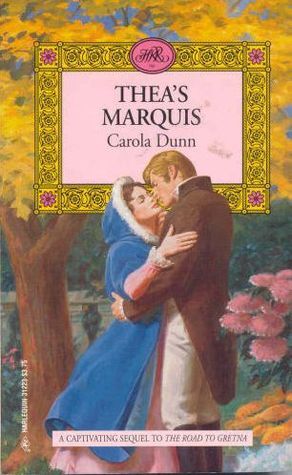 This is the third and final part of the trilogy, and unlike book 2, it really does help to have read the earlier books first. This is the book where all the pigeons come home to roost, so to speak. In book 1, fortune hunter Jason, Lord Kilmore tried to elope with Alison Larkin. In book 2, he actually did elope with an heiress, but when that fell apart, he married another heiress, Penny Bryant. This book picks up the story a few weeks or months later. Jason has already gone to London, and his mother, his two sisters and his new wife are travelling south from their home near the Scottish border to join him. Penny is pregnant and finding morning sickness rather a trial, and Megan is suffering from a migraine. The ladies stop at an inn, and it’s shy, timid Thea who’s dispatched to secure rooms for them, since the other ladies aren’t up to the job.
This is the third and final part of the trilogy, and unlike book 2, it really does help to have read the earlier books first. This is the book where all the pigeons come home to roost, so to speak. In book 1, fortune hunter Jason, Lord Kilmore tried to elope with Alison Larkin. In book 2, he actually did elope with an heiress, but when that fell apart, he married another heiress, Penny Bryant. This book picks up the story a few weeks or months later. Jason has already gone to London, and his mother, his two sisters and his new wife are travelling south from their home near the Scottish border to join him. Penny is pregnant and finding morning sickness rather a trial, and Megan is suffering from a migraine. The ladies stop at an inn, and it’s shy, timid Thea who’s dispatched to secure rooms for them, since the other ladies aren’t up to the job.
But there’s a problem – the inn is full because of a sporting event, and there are no rooms to be had. Happily for the Kilmore ladies, a passing hero rescues them by giving up his room, and his friend’s, too, and then inviting the ladies to dine with them. The hero is the imposingly large Lord Hazlewood and his small but dandyish friend is Will DeVine. And so begins the odd friendship between these two and the Kilmore ladies.
While Thea, having led a sheltered life, struggles to behave and speak in the ladylike manner favoured by her mother, every time she puts her foot in it, Lord Hazlewood is there to smooth things over. He is the perfect courteous gentleman, and she begins to feel that she would not mind having to meet him again in London. So on to London the ladies go, their way smoothed by the thoughtful Lord Hazlewood.
There they find that Penny’s house is practically bare of furniture, everything having been trashed by her uncle before he moved out. Jason has managed to make repairs and supply the bare bones of the required furniture, but not much more. He’s also shocked by Penny’s exhausted appearance, and not at all the loving husband she’d hoped to find. And so, unusually for a Regency romance, even though these two appeared to have achieved their happy ending in the previous book, the state of their marriage becomes a central concern of this one, and even more so when previous events come back to haunt Jason and make Penny unhappy. It’s an interesting, and very realistic, scenario and I applaud the author for not assuming that everything in the garden will be rosy as soon as a girl has a ring on her finger.
Meanwhile our pair of heroes, Mr DeVine and Lord Hazlemere, are circling round the two Kilmore ladies, lively Megan and shy Thea, not at all put off (in Lord H’s case) and only slightly put off (in Mr DV’s) by the fact that they live in Russell Square, home of cits and lawyers. Of course the road to happiness is not smooth, and there’s the usual dramatic finale, but it’s clear that these two are both perfectly matched couples. I have to say, I liked all the characters in this book, and the way their stories played out. Thea learns to be more assertive, Lord Hazlewood learns the value of allowing his emotions free rein occasionally, and everything is tied up satisfactorily.
There’s only one aspect of the book that gave me pause. Lord Hazlewood has a mistress of many years’ standing. Now, he does pay her off once he realises he’s thinking of marrying Thea, but up until that point, he visits regularly and they seem to have a very cosy relationship, more like husband and wife than anything else. And then Lord Hazlewood is surprised when his mistress is upset at the break up. My question would be: how could he NOT be upset himself? Why is he not a least partly in love with her? I’m not sure I can like a man who is so detached about ending a relationship of many years.
But I suppose this is par for the course with books of this age. There’s a very different morality at play, where mistresses and wives are two different things, and occupy separate places in a man’s life. However shocking it looks to us now, the world was a different place thirty years ago. Apart from that, I have no real grumbles. I would have liked a little longer with our primary couple post-proposal, but that’s true of virtually every book of this vintage, so it’s not really a complaint. A lovely five-star read.
Review: The Road To Gretna by Carola Dunn (1992)
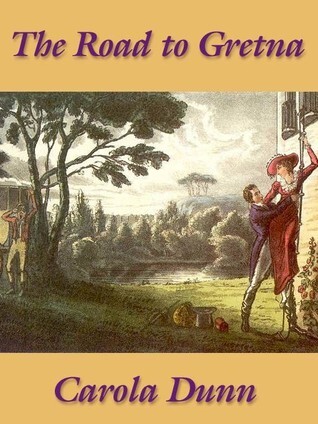 This was a complete riot. Two eloping couples meet on the way to Gretna Green, and as their journeys become more and more entwined, it becomes clear that the pairings are sadly mismatched. It’s a follow-on to A Lord For Miss Larkin, but there’s very little reference to that story, except that the hero here was the villain (of a sort) in the earlier book.
This was a complete riot. Two eloping couples meet on the way to Gretna Green, and as their journeys become more and more entwined, it becomes clear that the pairings are sadly mismatched. It’s a follow-on to A Lord For Miss Larkin, but there’s very little reference to that story, except that the hero here was the villain (of a sort) in the earlier book.
Here’s the premise: Jason, Lord Kilmore, is in desperate needs of funds to rescue him from penury. He tried in the previous book to elope with heiress Alison Larkin, but that came to nought. Now he’s eloping with heiress Henrietta White, who’s not the sharpest knife in the drawer, but pretty. And rich. Very, very rich. But when he arrives at Henrietta’s house in the dead of night, with a carriage awaiting them, the lady who drops into his arms, literally, from an upper window is not the delicate form of Henrietta, but the larger person of Penny Bryant. This scene is so redolent of Georgette Heyer’s The Corinthian, even to the name (Penelope) of the heroine that I was rather taken aback. However, it soon diverges as the two realise their mistake – they are both eloping, but not with each other. Jason has entered the wrong garden from the mews. Penny sets him right and they part amicably, Jason finds Henrietta, accompanied by her maid, a kitten and a mountain of luggage, and away they go.
Needless to say, the two couples, departing from the same spot and bound on the same journey, inevitably meet up several times on the road, and Jason and Penny are called upon to solve the many difficulties they encounter, many of them, it has to be said, created by Henrietta and her kitten (and who takes a kitten on an elopement?). Penny’s intended, the very Scottish Dr Angus Knox, is just as irritating as Henrietta in his way, especially when he descends into almost impenetrable dialect. I could have done with a lot less of the ‘dinnae ken’ and whatnot.
But our hero and heroine are lovely, and Jason redeems himself in spades for his behaviour in the previous book, when he was actually the villain of the piece, albeit a rather half-hearted one. And now we know why, because the author intended him to be the hero in this book. There’s a very nice ending, when Jason disposes in economical style of the villain of this book, and if it’s all very implausible, it’s also funny and oddly touching to see Jason the fortune-hunter rising to the occasion in magnificent style. A very enjoyable five stars.
Review: A Lord For Miss Larkin by Carola Dunn (1991)
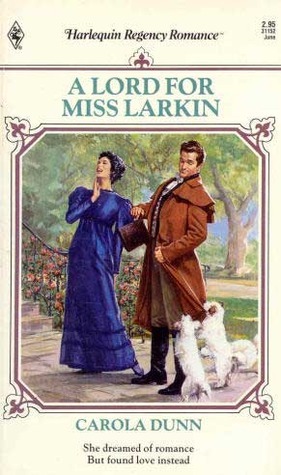 I’m a fan of Carola Dunn’s Regencies, and although they don’t all work for me, that’s true of any author, and the writing is always superb, even if I do occasionally want to throttle the hero. But no such difficulties here. Mr Philip Trevelyan is the perfect hero, a man who makes things happen and can always be depended on, and he has almost superhuman powers of restraint, a characteristic which all Regency gentlemen should display but often don’t.
I’m a fan of Carola Dunn’s Regencies, and although they don’t all work for me, that’s true of any author, and the writing is always superb, even if I do occasionally want to throttle the hero. But no such difficulties here. Mr Philip Trevelyan is the perfect hero, a man who makes things happen and can always be depended on, and he has almost superhuman powers of restraint, a characteristic which all Regency gentlemen should display but often don’t.
Here’s the premise: Miss Alison Larkin is living a hand-to-mouth existence in an unfashionable part of London, with a collection of gently eccentric aunts, three small dogs and one great big one (a Newfoundland, who turns out to have a starring role in the story). Another, even more eccentric, aunt returns, newly widowed, from India with her late husband’s fortune in her reticule. She’s determined to spend some of that money on Alison to give her a proper season, and a dowry to boot. None of the aunts is suited to sponsoring her in society, however, so the Nabob aunt engages Lady Emma Grant, the widow of a baron, to launch her.
At this point the story is the very conventional one of the unsophisticated debutante going through the usual rituals of buying new clothes, learning to dance, attending her first ball, hoping for vouchers from Almack’s and so forth. It’s very resonant of Georgette Heyer’s Arabella, with the beautiful young lady finding herself much sought after, and her suitors unaware of her humble background. The big difference is that Arabella is thought to be an heiress, whereas Alison actually is an heiress. The other principal difference is that Alison has set her heart on marrying a lord. I can’t remember whether any sensible reason was given for this or whether it was merely a whim, but although she understands that it’s unlikely, she is definitely leaning in that direction. Which is why she doesn’t even consider the very attractive Mr Philip Trevelyan, the first eligible man to cross her path in this new life of hers. It doesn’t help, of course, that he displays not the least interest in her, in fact, he seems rather to sneer at this upstart cit his good friend Emma has taken on. It also doesn’t help that the reader’s first sight of him is proposing to Emma (who fortunately turns him down).
As is the way of books of this era, Alison is pretty enough and lively enough and rich enough to spark a ton of interest from society gentlemen, and several of them are lords, too. There’s attractive but impoverished Lord Kilmore, for a start. Then there’s Alison’s charming cousin, Lord Deverill. And there’s steady but dull Lord Fane. And while Alison is focused on her bevy of lords, she’s slowly coming to depend on Philip, and he’s slowly coming to appreciate all her good points. So far, so predictable, and although her lords deplore the eccentric aunts and unfashionable home address, somehow it doesn’t stop Alison becoming a runaway success and getting those oh-so-important vouchers for Almack’s.
Now, none of this is enough to set the book much above the readable but unremarkable run of the mill for Regencies of the era. But towards the end, it manages to rise above the average in a most unusual way. This is somewhat spoilerish, so skip to the last paragraph if you don’t want to know any more.
When the other lords fall by the wayside, for one reason or another, and Lord Fane is the last one left standing, Philip does something quite remarkable. He’s well aware by this time that he wants to marry Alison, but he thinks she sees him merely as an avuncular white knight who rides to her rescue when needed. He thinks, too, that she truly wants to marry a lord. And why shouldn’t she have her wish? So he sets up a house party at his estate, invites Lord Fane and Alison, and leaves them to sort things out between them. As someone says to him, he’s taking a terrible risk, and if this story were to be written nowadays, undoubtedly the hero would muscle his way between heroine and lordly suitor, and do everything in his power to prevent the match. Or he might declare himself, and thus give her the choice. But no, with the true restraint of a Regency gentleman, he stands aside.
I have to say, though, that while I am totally in awe of such authentic principles, it puts the heroine in a terrible dilemma. It’s the great conundrum of life for a Regency heroine — does she accept the offer that’s on the table, even if it’s not perfect, or does she hold out for a better (or at least more palatable) offer, which may never happen? If she misjudges, she may end up married to the wrong man, or else left on the shelf altogether. This is why I’m always in favour of giving the heroine the full choice of options, and here her sponsor in society, Lady Emma, should have been alert to the possibility. She should have been whispering in her ear that Lord Fane was not the only man with a serious interest in her. How can Alison make a rational choice without all the information?
But of course, everything comes right in the end, although not without a little gratuitous melodrama to liven things up, and give the hero the opportunity to show off his heroic tendencies. A lovely read, beautifully written and totally authentic. Highly recommended. Five stars.
May 29, 2023
Review: Miss Percy’s Travel Guide to Welsh Moors and Feral Dragons (2022)
 I absolutely loved the first book of this series, so reading this follow-on was a no-brainer. Curiously, though, although it started out in grand style, I soon found my interest waning. Twice I set it aside to read something else, or several something elses, and grew increasingly reluctant to pick it up again. I’m not quite sure why, because all the elements I loved in the first one are here again, but somehow it just didn’t work as well for me.
I absolutely loved the first book of this series, so reading this follow-on was a no-brainer. Curiously, though, although it started out in grand style, I soon found my interest waning. Twice I set it aside to read something else, or several something elses, and grew increasingly reluctant to pick it up again. I’m not quite sure why, because all the elements I loved in the first one are here again, but somehow it just didn’t work as well for me.Here’s the premise: unlikely heroine Miss Mildred Percy escaped from dreary middle-aged poor-relation-dom in book 1 by accidentally hatching a dragon, aided by even more unlikely hero, Mr Claude Wiggan, the even more middle-aged vicar. Now, accompanied by Mr Wiggan’s housekeeper/cook, Mrs Babbinton, they have embarked on a journey into Wales to find the legendary Nest of Dragons and (they hope) someone who knows something about them and can help them raise Fitz (the dragon). They didn’t expect it to be easy – and it isn’t! Along the way, they encounter all sorts of problems, like terrified locals, deceptive allies and relations, not to mention a dragon who spouts fire at all sorts of inopportune moments, but they also find that not everyone disbelieves the legends of dragons, and they find friends in some odd places. I’m not going to spoil the plot by telling you any more about it. Suffice it to say there are some surprising twists along the way (well, they surprised me!).
The author has developed a unique writing style for these books, a rambling loosely-threaded stream of observations and asides in nested parentheses, sometimes even breaking the fourth wall to talk directly, author to reader. Not everyone likes it, but I think it’s clever and funny and actually works very well, most of the time. And therein lies the rub. This book seemed to be somewhat more action packed than the first one, and this long-winded style of prose just doesn’t work with the tension of (say) a confrontation with a pitchfork wielding mob. I found myself skipping whole paragraphs just to find out what happens, and that’s a shame, when every seemingly meandering sentence is actually so carefully constructed. This problem seemed less acute at the end, or maybe I’d got more used to it by then, I don’t know, but there were too many times when it felt intrusive rather than charmingly quirky, and that’s a crying shame.
The other problem, I think, is repetition. I got a little tired of hearing just how dishevelled the travellers were, and how Mrs Babbinton rustled up cakes in thirty seconds out of nothing at all (it seemed), and how tired and dirty and rain-drenched they were. Does it never stop raining in Wales? Apparently not.
But Miss Percy and Mr Wiggan continue to delight, and if they are off to London in the next book (as seems likely) I sincerely hope they take the time to pop into church and get married, because they deserve a little marital happiness. A good four stars, but for anyone thinking of trying it out, I recommend reading a little sample first, in case the quirky writing style grates on you.
Review: A Regency Scandal by Alice Chetwynd Ley (1979)
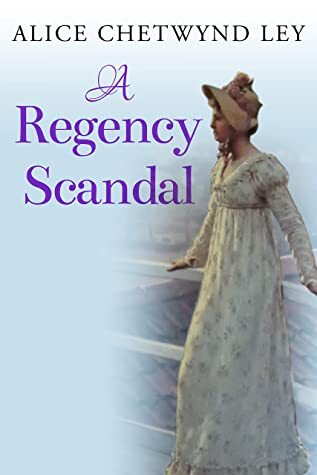 This is a strange book. I’ve read other books by this author, and they were all light, fluffy affairs. This is a much more serious read, longer, wordier and darker generally. It also has an odd structure, where the first third of the book is essentially prologue, a long, rambling exposition of the backstory to the main part of the novel. It would be very easy to read the blurb and start reading and then wonder if you had the wrong book altogether. I know, because that’s exactly what I did.
This is a strange book. I’ve read other books by this author, and they were all light, fluffy affairs. This is a much more serious read, longer, wordier and darker generally. It also has an odd structure, where the first third of the book is essentially prologue, a long, rambling exposition of the backstory to the main part of the novel. It would be very easy to read the blurb and start reading and then wonder if you had the wrong book altogether. I know, because that’s exactly what I did.
The first part of the book deals with an earlier generation, with Viscount Shaldon, son and heir of the Earl of Alvington. Shaldon is a weak man, quite unable to stand up to his strong-minded father, and held financially captive by him. But he’s also quite unable to keep himself out of trouble. So when he’s attracted to a pretty, vapid and quite unsuitable girl who’s barely gentry, he thinks it would be a clever wheeze to marry her. That will show his father that he’s his own man! But somehow, he never quite summons the courage to tell his father what he’s done, and when his father pushes him towards a far more suitable match, to the daughter of a neighbour, Shaldon dithers about, putting off the moment when he absolutely has to offer for her, but also rapidly losing interest in his wife, now in the sickly throes of pregnancy.
But fortuitously the wife dies in childbirth, her mother, thoroughly disenchanted with her son-in-law, scarpers with the child, and Shaldon is able to pretend it never happened and offer for the neighbour’s daughter. She’s head over heels in love with him, so she accepts at once, and this should be a happy ending. But a weak man like Shaldon isn’t going to reform his character overnight, or possibly at all, so the marriage isn’t a happy one.
The main part of the book is set firmly in the Regency, and deals with the next generation. Shaldon is now the Earl of Alvington, and his son from his second marriage is now twenty-five. Various other offspring of characters from the first part are all reaching adulthood, the men sprigs of fashion on the town and enjoying their freedom, the women making their come-out in London, but with all the history from the previous generation as baggage. And history is repeating itself, for the current earl is bent on making a good match for his son with a neighbour’s daughter. But this Viscount Shaldon is not his father – he’s just as reluctant to be pushed into matrimony before he’s ready, but he’s not financially dependent on his father, having inherited an estate from a relative.
The earl is not willing to be gainsaid, however, and determines to thwart his supposed heir by finding his son from his first, secret marriage, disinheriting the son from the second marriage, and never mind what scandal may ensue. Such a nice man.
This is in essence the major plot of the second part of the book, but it’s woven through with the romantic entanglements of the younger generation. This part, taking place almost entirely in London during the season, is very much more like other Chetwynd Ley books, so don’t be put off by the protracted opening, keep going and it does conform more to expectations. I’m not going to say anything about the romances (yes, there are several) because none of them lit me on fire. I liked some of the characters, and the younger Viscount Shaldon is a far more honourable man than his father, but they all seemed a bit ordinary to me. The villains brought about their own downfall far too easily for my liking, and the resolution to the matter of the missing heir was all a bit of a damp squib in the end.
I did enjoy this, once it got going, and I applaud the author for stepping off the well-worn path and trying something a bit different. So many Regencies depend for their resonance on great secrets from the past, but this is the first book I can remember which has shown the whole of the backstory, not just a short prologue or little snippets here and there. I don’t think it’s totally successful, but it was still a solid four star read for me.



